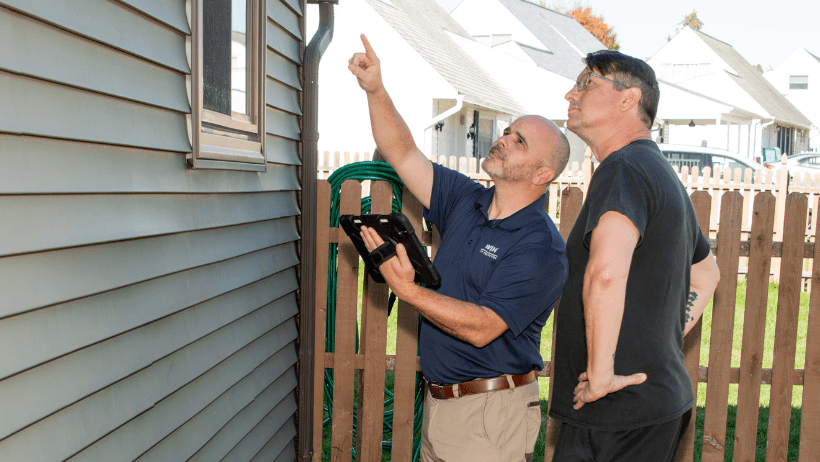
Maintaining cleanliness in rental properties is essential to comply with the Housing Health and Safety Rating System (HHSRS) and ensure tenant safety and satisfaction. A clean and organized property not only meets legal requirements but also promotes a healthier living environment for tenants.
In this guide, we’ll cover the HHSRS cleanliness standards and practical tips to help landlords prepare their properties for successful house inspections.
What Is the HHSRS?
The Housing Health and Safety Rating System (HHSRS) is a risk-based evaluation system used to identify and address potential hazards in residential properties. Cleanliness plays a significant role in meeting HHSRS standards as it impacts health and safety factors, such as pest control, air quality, and hygiene.
Importance of Cleanliness for HHSRS Compliance
1. Protect Tenant Health
Unclean environments can lead to:
- Pest infestations: Attracting rodents, cockroaches, and other pests.
- Bacterial growth: Caused by unclean surfaces and accumulated dirt.
- Respiratory issues: Due to mold and poor air quality.
2. Prevent Property Damage
Neglected cleanliness can result in long-term damage, such as:
- Mold growth on walls and ceilings.
- Blocked drainage systems from accumulated debris.
- Structural damage due to pest infestations.
3. Legal Compliance
Failing to maintain cleanliness standards can lead to legal action, fines, and potential tenant disputes.
Common Cleanliness Issues in Rental Properties
1. Pest Infestations
Unsealed food, overflowing bins, and clogged drainage attract pests.
2. Mold and Damp
Poor ventilation and unclean surfaces lead to mold growth, which poses health risks.
3. Accumulated Waste
Improper waste disposal or irregular waste collection results in unhygienic conditions.
4. Unhygienic Shared Spaces
In Houses in Multiple Occupation (HMOs), shared kitchens, bathrooms, and living areas often become hotspots for cleanliness issues.
HHSRS Cleanliness Standards for House Inspections
1. Waste Management
- Provide sufficient bins for general waste, recycling, and food waste.
- Ensure regular waste collection and proper disposal.
2. Pest Control Measures
- Seal potential entry points to prevent pests.
- Regularly inspect for signs of infestations and address them promptly.
3. Mold Prevention
- Maintain proper ventilation in all rooms.
- Clean damp-prone areas frequently to prevent mold growth.
4. Hygienic Shared Spaces
- Establish cleaning schedules for shared areas in HMOs.
- Use durable, easy-to-clean materials for surfaces.
5. General Cleanliness
- Keep floors, walls, and ceilings free from dirt and stains.
- Regularly clean windows, carpets, and upholstery.
Practical Tips to Achieve HHSRS Cleanliness Standards
1. Conduct Regular Inspections
Inspect your property frequently to identify and address cleanliness issues before they escalate.
2. Educate Tenants
Provide tenants with clear guidelines on cleanliness expectations and waste disposal practices.
3. Hire Professional Cleaning Services
Invest in professional cleaning services for thorough maintenance, especially in shared spaces.
4. Use Quality Cleaning Supplies
Stock the property with high-quality cleaning products to make it easier for tenants to maintain cleanliness.
5. Implement Cleaning Checklists
Provide tenants with detailed cleaning checklists to ensure all areas are regularly cleaned and maintained.
Benefits of Meeting HHSRS Cleanliness Standards
1. Improved Tenant Satisfaction
A clean property enhances tenant comfort and reduces complaints.
2. Enhanced Property Value
Well-maintained properties retain their value and are more appealing to potential tenants.
3. Legal Peace of Mind
Compliance with HHSRS standards protects landlords from legal disputes and penalties.
4. Healthier Living Environment
Cleanliness reduces health risks, promoting tenant well-being.
How HMO Horizon Can Help
At HMO Horizon, we specialize in helping landlords meet HHSRS cleanliness standards. Our services include:
1. Property Inspections
We conduct detailed inspections to identify areas that require cleaning and maintenance.
2. Customized Cleaning Plans
Our team creates tailored cleaning schedules and strategies to meet HHSRS standards.
3. Tenant Education Programs
We provide educational materials and workshops to help tenants understand their role in maintaining cleanliness.
4. Ongoing Support
We offer continuous support and advice to ensure your property stays clean and compliant.
For expert assistance, call us today at 07872076460 or visit our website.
Conclusion
Meeting HHSRS cleanliness standards is essential for successful house inspections, tenant satisfaction, and legal compliance. By addressing cleanliness proactively, landlords can create safer, healthier rental properties.
Trust HMO Horizon to guide you through every step of maintaining HHSRS compliance. Contact us at 07872076460 or visit our website for expert support.
FAQs
1. What is the HHSRS?
The Housing Health and Safety Rating System is a risk assessment tool used to evaluate and address potential hazards in rental properties, including cleanliness issues.
2. How can landlords ensure cleanliness in shared spaces?
Landlords can establish cleaning schedules, provide quality cleaning supplies, and educate tenants about their responsibilities.
3. What are the consequences of failing to meet HHSRS cleanliness standards?
Non-compliance can result in fines, legal disputes, and tenant complaints.
4. How often should landlords inspect their properties for cleanliness?
Regular inspections, at least once a month or after tenant complaints, are recommended.
5. Can HMO Horizon help with HHSRS compliance?
Yes, HMO Horizon provides property inspections, cleaning plans, tenant education, and ongoing support to help landlords meet HHSRS cleanliness standards.